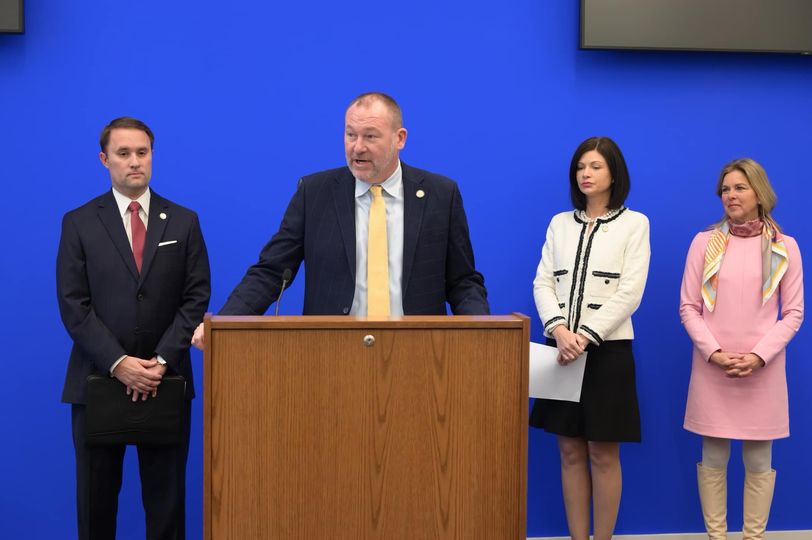By Bill Atkinson | Published January 10, 2024
RICHMOND – Calling it “modern-day slavery” that needs to be eliminated, Del. Mike Cherry said Wednesday he would carry legislation that would put an end to human-labor trafficking in Virginia.
That bill, introduced Wednesday prior to the 2024 General Assembly convening, has bipartisan support. Cherry, a second-term Republican from Colonial Heights, and Del. Karrie Delaney, a Fairfax County Democrat beginning her third term in the House, are co-sponsoring House Bill 633 with the backing of Gov. Glenn Youngkin’s administration and the state attorney general’s office.
Attorney General Jason Miyares and first lady Suzanne Youngkin also attended the news conference at the General Assembly Building.
Forced labor makes up about 40% of all human-trafficking in Virginia, Miyares said Wednesday, but Virginia is the only state where labor-trafficking cannot be prosecuted at the local level. Any case related to this must be tried at the federal level.
The Cherry-Delaney legislation – House Bill 633 – makes labor trafficking a Class 4 felony, the same as sex trafficking. It would also be a Class 3 felony if the person being trafficked is a minor.
Anyone who uses force or threats to make someone work against their will while simultaneously benefitting financially from the forced labor would be prosecuted. Victims of labor trafficking could also sue their former exploiters under the legislation.
“Human trafficking is modern-day slavery,” Cherry said, “and it is not acceptable.”
The proposed legislation gives local prosecutors “much-needed help to end the scourge of human trafficking,” Cherry said.
Last November, Democrats regained slim control of the House of Delegates from Republicans. So, Cherry – who has carried trafficking legislation for the attorney general’s office previously – needed someone from the majority party as a chief co-sponsor.
Delaney called the bill “one of the most bipartisan measures before us” in the 2024 session. Throughout her legislative career, Delaney said she has worked to strengthen sex-trafficking prohibitions. She called the labor bill “an important extension of that work.”
Labor trafficking has been found in many business areas – agriculture, domestic work, construction, landscaping and manufacturing. Many victims are children or migrant workers.
Last August, the feds convicted the operators of a Williamsburg laundry company for labor trafficking. All of them were sentenced to prison terms.
“This is an issue that regardless of political party, we can all support,” Delaney said.
Human trafficking is the second largest illegal business in the U.S. behind narcotics trafficking. Miyares said it generates about $150 billion in annual revenue.
He cited the Williamsburg case as one “that could not be brought in state court” due to the lack of a statute.
“From day one, that was something we recognized needed to be changed in Virginia,” the attorney general said.
The 2024 session is the first time the legislature will take up labor trafficking as a stand-alone crime. When asked why it has taken so long to take up, Cherry said he saw it as more of a “process” that began with sex-trafficking criminalization in 2012.
“Bringing in labor at the same time was just going to be too much of a lift,” he said. “We didn’t have the manpower, we didn’t have the resources to undertake that. Now, 12 years down the road, we do have the resources. We do have the administration that wants to make that happen.”
In brief remarks, Suzanne Youngkin noted that anti-trafficking issues were “one of the very first executive orders that Glenn signed.”
“This is not passionate politics,” she said. “It’s passionate people.”
As of Wednesday afternoon, the Cherry-Delaney bill had not been assigned to a committee for review. It is expected, though, to go before the House Courts of Justice Committee.

